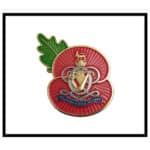Major Henry Herbert Firth, who died on 3rd February 1992 was one of the dwindling band of 8th Hussars who served throughout the North Africa campaign, through N.W. Europe from Normandy to Hamburg and also took part in the Victory Parade in Berlin in July 1945.
Born in 1915, Herbert Firth was Londoner who joined the Army in 1936, was granted an Emergency Commission from the rank of Sergeant and was posted to the 8th Hussars in Egypt in 1940.
He was in the first action of the Desert War when the Regiment crossed the frontier out of Egypt on 19th July 1940 to harass Italian convoys and, apart from two short spells in hospital, continued throughout the campaign until the regiment left Egypt in November 1943.
Always a ‘C’ Squadron man, he took command when the Squadron leader, Major Shan Hackett, was wounded in May 1942, and later that year took command of a composite squadron in the 4th/8th Hussars during the advance after the battle of Alamein.
For his services in the Desert ‘Bettie’ Firth was Mentioned in Despatches, but within the regiment, his self-made reputation was his consummate skill as an Astral Navigator.
In the days of rudimentary equipment such as the magnetic compass and the sun compass, his ability, when movement was usually by night, to find the rendezvous marked only by an electric bulb on a lorry, often indistinguishable from the stars he had been following, was considered miraculous.
When the 7th Armoured Division crossed to France after D-Day in 1944, he was second-in-command to Major Henry Huth’s ‘C’ Squadron, and after being in action throughout the campaign in N.W. Europe, he took command of the Squadron in his own right in April 1945 when it was engaged in the last action by the 8th Hussars in World War II at Daersdorf not far from Hamburg.
Granted a Regular Commission after the war ended, he went to the Staff College, Camberley in 1948 and was then occupied with a number of staff appointments, but peace-time soldiering did not appeal to him and he retired in 1950.
Always generous with his time and ability, he devoted much of his retirement working for voluntary welfare organisations such as the Citizens ‘ Advice Bureau and S.S.A.F.A.
But his heart was always with the Regiment and he seldom failed to attend any function from Amalgamation to Tercentenary celebrations and Association dinners.
He was a founder member of the Durham Troop and happily attended all their meetings. His cheerful and friendly presence will be sadly missed by his many friends and wartime colleagues.



